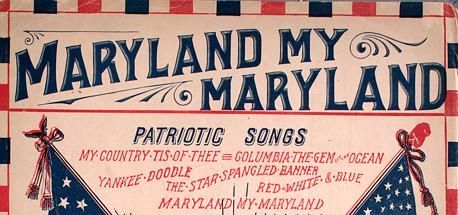


By Sam Francis
03/15/2001
Having ripped down every Confederate flag in sight, the armies of tolerance are now aiming their big guns at state songs their generals find offensive. Virginia’s quaint ballad, "Carry Me Back to Old Virginny," (play) was retired a few years ago, and now Maryland’s anthem, "Maryland, My Maryland", (play) is in the gun sights.

The chief foe of the hauntingly powerful song is not the usual pack of do-gooders and Afro-bigots, but a teenage schoolboy named Ben Meiselman. As The Washington Post reports, back when he was a mere stripling of 9 years, Master Meiselman was looking for a topic for his school civics project and, at his dad’s suggestion, started a crusade to change his state’s official song. With two classmates, he persuaded a Democratic state legislator to sponsor a bill to drop "Maryland, My Maryland" as the state anthem.
"The words are dense and hard to understand," whines the juvenile reformer, now a thoroughly mature 15, "And basically they tell Maryland to secede from the Union. Most parts you can’t understand. And the parts I can understand, I don’t like."
So, because young Mr. Meiselman isn’t smart enough to understand some of the words and because he doesn’t like what he does understand, the song has to go. Nevertheless, however much it might amaze the Meiselman family, the words are not hard to understand, nor are they unlikable. Indeed, once you understand them, you see there is every good reason for Maryland to keep the song as its anthem.
One of the most offensive parts, according to the Meiselmans, is the first stanza, although Meiselman assures us "The words actually get worse as you go along." The stanza croons that "The despot’s heel is on thy shore" and calls on Marylanders to "avenge the patriotic gore that flecked the streets of Baltimore." But, unsuspected by the Meiselmans, there is an immense amount of history and patriotic legend packed into the lines.
When the Southern states seceded from the Union in 1861 to form the Confederacy, secessionist sentiment was strong in Maryland, a slave state. It didn’t secede, but when Union troops of the Sixth Massachusetts regiment changed trains in Baltimore, a secessionist mob attacked them and killed two to four soldiers. In retaliation, the troops opened fire and slaughtered at least nine civilians. The "patriotic gore" in the Baltimore streets was the blood of Confederate sympathizers.
The "despot," whose heel is on the shore, is, of course, the sainted Abraham, who understood that he had to keep Maryland in the Union or be surrounded by hostile Confederate states in Washington.
As historian Clement Eaton recounts the story, "Southern sympathizers were imprisoned in flagrant violation of their civil rights. Nineteen members of the Maryland legislature as well as Mayor Brown of Baltimore were arrested and unceremoniously thrown into jail." U.S. Chief Justice Roger Taney, himself a Marylander, tried to get one prisoner released through a writ of habeas corpus, but Lincoln ignored it, again in flagrant violation of the Constitution. "Hundreds of citizens," writes Eaton, "were illegally arrested under the authority of the President, and … the hall of the Maryland legislature was closed by the provost marshal."
It ought to be pretty clear why the song, written soon after these events by Southern sympathizer James Ryder Randall, calls Lincoln a "despot." Randall was far from being the only American who thought so, and it ought to be clear as well why some people today don’t want the song to be sung at all, much less to be the anthem of a state. Too much jabber about patriotism and liberty, you see; too much talk about taking arms against despots and the violation of constitutional rights; too much criticism of Father Abraham and the bloody and unconstitutional regime he created. Such songs are dangerous.
"Maryland, My Maryland" has nothing to do with slavery. It has everything to do with the core myths of the American identity — that government uncontrolled by law is tyranny and violent resistance to tyranny is a patriotic duty. The song was not adopted as the state’s anthem by slaveholders or Confederate sympathizers. It was adopted in 1939, a few years after the Late Unpleasantness was over, and it was adopted because the values it celebrates are not limited to the Confederacy and its heritage but belong to all Americans.
It’s not surprising that in the First Universal Nation being manufactured in Washington, Hollywood, and New York, such values have to go, the events that embody them have to be forgotten and any song that enshrines them in its lyrics can’t be sung. If Marylanders were really still Marylanders, they'd sing their state song more often and louder than ever¾and politely suggest to the Meiselman family that it might be happier if it moved to Massachusetts.
COPYRIGHT 2001 CREATORS SYNDICATE, INC.
March 15, 2001